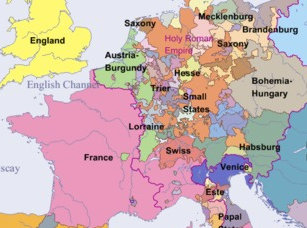Look at a map of Europe in the mid-15th century, and it?s close-enough but a little funny-looking. Spain is in the right place, though there?s a line down the middle separating Castile and Aragon. France is a bit shrunken, and Germany looks like someone threw up a bowl of Lucky Charms. And right between France and the German blob is, uh, something.
 ?They?re after me lucky HRRRRNGGGGH?
?They?re after me lucky HRRRRNGGGGH?
In this case the ?something? is Burgundy, a state that migrated around a bit but ended up comprising the lowlands, Luxembourg, and chunks of modern France in between. The Duchy of Burgundy existed as an independent country in various forms from about the 10th century through the mid-15th, and disappeared when Duke Charles the Bold died without an heir and its territories were absorbed ? through a sort of geopolitical Jarndice v. Jarndice featuring lots of bloodshed ? by France and the Habsburgs.
This brings up two interesting points. First, history is weirdly contingent; if Charles the Bold had had been less bold and more fecund, there might be a country in between Germany and France. And second, some parts of history are mostly forgotten until they get incorporated into video games.
I would bet that of the people who read this and already knew what happened to Burgundy, the majority learned it from playing Paradox?s Europa Universalis series, where Burgundy?s dissolution and partition are an important early-game event. The rest of you are strange. Europa is on its fourth incarnation, covering world history from 1444 to 1821, and is a great example of video games as an art form: it manages to make the point that history has some randomness, but generally makes sense, and it manages to be fun, too.
Sandboxing and Railroading
Europa Universalis 4 (EU4 from now on) is a historical real-time strategy game. As with other games in the genre, players gather resources, make alliances, and generally try to conquer the world. There are two directions a game like this can go: some games, like the Civilization series, take the ?sandbox? approach. They make all countries equivalent but for some almost-cosmetic differences. In Civ, every country starts out at population and technology parity, and resources don?t vary especially much. So a Civ game typically ends with something bizarre, like Mongolian legionnaires and trebuchets besieging London, or the Zulu Republic launching a nuclear first strike on Brazil. The timescale of the game also forces some annoyingly unrealistic changes, even in historical scenarios i.e. the Pacific Theater of World War Two works like this: America builds the world?s largest, best-equipped army in a year, spends three years crossing the Pacific Ocean, and conquers the entirety of Japan in a month.[1]
At the other end of the scale, some games railroad: they lock players into a pretty linear path, where they fight a predetermined set of battles and reach a particular objective at the end.
EU manages to do something different and impressive: it locks characters into a roughly-historical narrative, where Europe slowly consolidates and conquers other parts of the world, England rules the British Isles but loses its territory on the mainland, the Ottoman Empire quickly conquers and slowly loses the Balkans and Middle East, Venice loses its importance as a port ? but mostly manages to do this through in-game mechanics that actually make historical sense.
Take Venice, for example. Historically, Venice was rich because some of the world?s most valuable goods were produced in India and China, and shipped over land to Europe. Europeans didn?t make much of value, so they exported precious metals instead. Over time, though, Europeans did learn to make some useful things (many of which involved gunpowder and projectiles), built longer-range ships, and started moving goods more cheaply over the ocean. Venice went into an imperceptibly slow decline; over the past five centuries their biggest policy issue has switched from battling the Ottomans over Crete to figuring out how to make tourists less tacky.
Anyone can design a game where ?if year == 1600 then venice_entrepot_volume *= 0.5,? but it takes some talent to build a game where that?s just what happens as an emergent property of how the game goes. Because, once that?s true, you can do something about it: a player who controls Venice can conquer other bits of Italy to get less reliant on Middle Eastern trade, or conquer bits of the Middle East ahead of the Ottomans to get more control that way.
The game is full of little mechanics like this. Some kinds of territory are pointless to control but easy to defend, like mountains. This means that states like Georgia last for a long time, while hard-to-defend Russian principalities consolidate into one giant Russian blob.
The game does nudge players into historically-accurate behavior, by giving countries historically-relevant traits, and historically-relevant bonuses for appropriate behavior. So Austria is designed to be effective at diplomacy, while Brandenburg/Prussia is geared towards conquest. But players don?t have to follow those rules. You can start as Holland, eschew the navy, and conquer Denmark if that?s your thing; Muscovy can be a quiet, prosperous merchant Republic instead of an expansionist hegemon.
The game is open to different playstyles, and these, too, tend to fall on two axes, closely related to the sandbox/railroad dynamic.
Min-Maxing and Role-playing
?Min-maxing? is a term of art for playing a video game in order to squeeze out every possible droplet of efficiency. If you?ve ever used the Exit Strategy app, of if you wish you?d thought of it, you may be a min-maxer. Role-playing is, of course, playing a role: if you?re ruling Portugal, that means colonizing South America; if you?re playing one of the Manchu tribes, it means conquering China.
Since EU4 is complicated, it?s extremely amenable to min-maxing; there are something like ten separate resources players can optimize against, and they can engage in Kama Sutric acts of alliance-building and war-mongery with a couple hundred different countries. So some players compete to achieve extremely elaborate and weird outcomes, like having the steppe raiders of Kazan elected Holy Roman Emperor, or making Japan an Islamic Theocracy. Conquering the world requires a ton of tedious min-maxing, as players juggle money/manpower shortages, angry coalitions, and the tradeoff between technology and growth.
But since EU4 is a historical game, with lots of attention to detail, it?s also fun for mild patriots of all stripes. It?s almost a rite of passage for EU4 players to work their way down their family tree, role-playing as the home countries of different ancestors.
And it?s entirely possible to compromise, by role-playing as one of history?s greatest min-maxers. Imagine Prussia ruled by twenty consecutive Fredericks the Great, Russia ruled by twenty straight Peters the Same, France under a Louis XIV-I through Louis XIV-XX, or a Safavid dynasty that didn?t settle for just ruling Persia.
Community
Some Internet communities get labeled ?toxic,? and there?s not an obvious pattern: what do young-adult fiction and the Lisp programming language have in common? The EU4 community is weirdly non-toxic. Newbs and veterans mingle just fine, people rarely get flamed, the comments are helpful, the advice is good. What gives?
I was grasping for other communities to compare it to, and I came up with two: lifting, and investing in stocks other than Tesla.[2] What?s interesting about both of these communities is that they?re a) competitive, in the sense that you can readily compare yourself to other people, but b) the participants in the community aren?t competing head-to-head, and success for participants feels positive-sum. These are also communities where the community interaction doesn?t determine the outcome; a sick burn about someone?s diet or form or alliance strategy or financial model isn?t going to make you any stronger/better at world conquest/richer. It?s just going to make you an annoying troll nobody wants to help.
The variety of playstyles also makes the community a decent place to learn. Sometimes, players learn history the hard way: ?The religious league war was hell because the Ottomans intervened, and so did France ? on the Protestant side!? Buddy, if you?re mad, just think about how upsetting it was to the Habsburgs when that exact thing happened. And sometimes questions are just vague enough to sound like they?re requesting a totally different kind of answer.
In Conclusion, Zero Stars
EU4 is a fun game that does a good job of simulating a near possible world. Unfortunately, it takes up gobs of time. The side effect is that you end up reading lots of history (I bought this in high school and actually read it last year when my Muscovy game got boring). Games are a good way to spend mindless time, but a sufficiently good game requires mindful time. Careful planning, weighing options, creating complicated and devious plots, all these can take arbitrary amounts of time.
A few weeks ago, my wife saw me staring into space. ?You look worried. What?s wrong??
?Ottomans.?
My experience with EU4 was that it was fun but addictive, and tended to be a big distraction for the conspiracy-spinning part of my brain, which could be better-used in actually conspiring. So, I uninstalled it.
Don?t miss the next story. Sign up for my occasional email newsletter. Or check the About/FAQ page for more.
[1] The same team that did Civ 2 made Alpha Centauri, also one of the best games of all time. Since it?s set in the future right after a population bottleneck, the sandbox approach makes lots of sense, and the result is a game with the rare distinction of being better than the book. Alpha Centauri is best enjoyed as a work of interactive science-fiction, where the goal is not so much to win as to survive long enough to read all the flavor text.
[2] Elon Musk, exceptional in so many ways, is the rare American CEO to openly dox a short seller and try to get him fired. Plenty of CEOs do this, of course, but there?s a traditional, white-glove approach to ruining your critics, which Musk disregards.

